China it is a huge country. So huge, that there are big differences between the provinces in issues like cultures, habits, customs and traditions. Apart from the Han tribe, there are other 55 national minorities. All descriptions of Chinese customs I have described below relate to one Chinese region and should not be regarded as a template of whole Chinese behaviors.
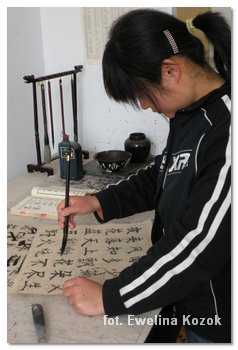
Writing . Chinese characters unfortunately rarely presents optically what they represent. Most of the characters has nothing graphically similar to an indicative word, such as “sun” sign won't be similar to the “sun” shape. Indeed, the characters often means sound (syllable). Characters of the same syllable but different tone look completely different. Most Chinese words are created by combining two separate characters (like example - the word "good" is two characters combined together: a woman and a child). So as you read Chinese characters you read just syllables, and it create words together, as in our alphabet. Simple? The only problem that there are more than 100,000 characters. But to easily read a newspaper, you just need to know a few thousand of them. Now a simplified writing form exist, known as "pinyin" - Chinese writing using the Roman alphabet.
Chinglish - this is an English language in a specific Chinese form. It was created by wrong translation, as a result we can laugh a lot. It looks like someone put a text into electronic translator such as google translate, and we all know that you cannot rely on such an translation. Below I give some examples, and you can see more pictures here .
- Hotel room for an hour has been translated into "o'clock room”
- Exit from the building has been translated into "ex-port"
- Roundabout has been translated into "turn plate”
- Recyclable has been translated into "retrievable"
- School class review has been translated into "recycle"
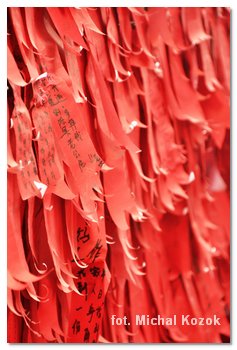
In China many holidays are celebrated. The most important is Chinese New Year, known as "Spring Festival". Every year on different date (according to our Gregorian calendar). It all depends on the moon stage, but the New Year is around the end of our January or up to end of February. For this period most state institutions are closed for two weeks. Longer holidays are also occur in the first seven days of May - "Labor Day" and "Youth Day", and the first week of October due to establishment of People's Republic of China (01/10/1949). In addition there are other public holidays in the following days: Our New Year's Day (1st January), Women's Day (8th March), Children's Day (1st June), Birthday of the Chinese Communist Party (1st July), anniversary of Liberation Army (1st August).
In 1978 one-child policy was introduced. In practice this means that each family can have only one child, and in case of having next one, the family is punished with a high fine. But there are exceptions when the family may have a second child without penalty. In villages if the first child was a girl, after some period parents may decide for a second child. I often heard that people 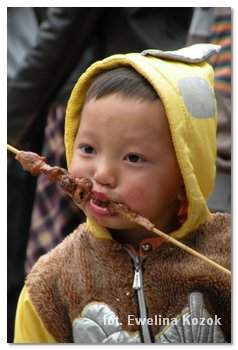
From the negative people behavior the most annoying me smoking, spitting and littering. Entering the buildings, buses, toilets etc. is associated with cigarette smog, in one moment your clothes will smell with nicotine. This is due to the fact that almost every man smokes and, unfortunately, they don't care about children, ladies and others - "I want to smoke, I like it and I'll be smoking wherever I like" – the simplest respond. Even in the gym I met a guy who smoked during lifting weights.
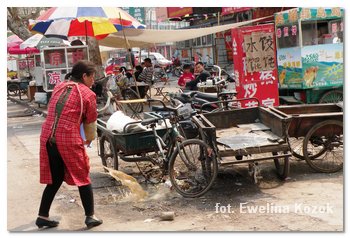
Here is not the cleanest place on the earth - garbage are everywhere. "Have you finished lunch my son? - So, throw the plastic bag on the floor, the chicken remains as well”. After 10 hours trip by train or by bus it's not hard to imagine how the floor looks like. Macabre. I don't quite understand why kids are allowed to piss in the bus on the floor, even when a bus is on a break!
It was hard to me to get used to a situation when we are informed in the last minute. The school was disorganized, some decisions were made without earlier planning. Sometimes the decisions could be pass earlier, but why? It's easier to control people who are confused. No informing us happened often – regarding the school exams, competitions, official meetings etc. I do not know whether this is lack of respect, or a cultural difference?
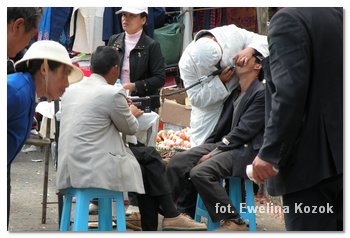
China's greatest surprise for me was the lack of some products in the stores. And here I mean the lack of chocolate, cheese, butter, cream or not sweet bread. I even could not buy a cheap ordinary Chinese T-shirt (on winter time). Actually in Sydney I can find cheaper Chinese kitsch, and here sometimes I couldn't find it at all or when successfully, the plastic product sometimes cost much more than in Poland or in Australia!
I'm 178 cm tall and 66 kg weight. In Poland and Australia I mostly buying cloths in Medium size . In China the smallest matching me cloth was XL, but it even happened that perfectly fit on me pants was at size XXXL:)
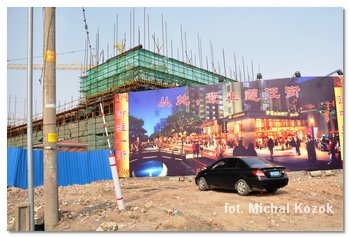
Public toilets is a separate topic. Even if I skip a tragic hygienic condition, inside there is lack of privacy - it is a big common room without the doors, or sometime even without the walls, so everyone can look at each other.
Using the Internet you do not have an access to large number of the world's most popular websites. In addition to political and pornography censorship, there are also blocked sites like: facebook, youtube, world travel blogs. Wikipedia still works, but without pictures, as on google imagine search I very often cannot see the pictures on my computer screen.